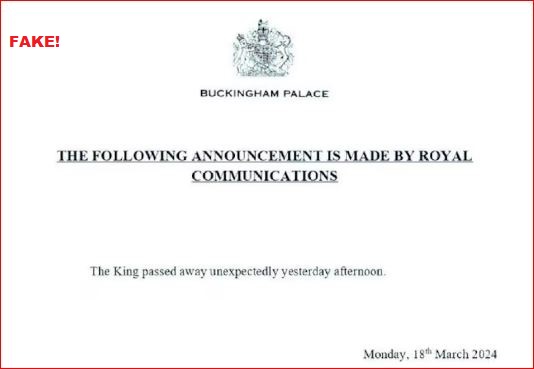British embassies faced a flurry of inquiries after several prominent Russian media outlets erroneously reported the death of King Charles III, sparking widespread speculation and concern.
The reports, which surfaced on Monday, alleged that the monarch had succumbed to complications from cancer at the age of 75. Among the outlets disseminating the false information was Russian newswire Sputnik, which stated, “King Charles III of Great Britain has died, according to media reports.”
The news quickly gained traction, prompting the UK embassies in Ukraine and Russia to issue swift statements refuting the claims and urging the public to disregard the misinformation. Notably, a counterfeit Buckingham Palace statement announcing the “unexpected death” of the king circulated on various social media platforms, further fueling confusion.
The UK embassies in Ukraine and Russia both issued statements refuting the reports.
“News about King Charles III death is fake,” the UK embassy in Ukraine said in a post on X.
🇬🇧 We would like to inform you that the news about the death of King Charles III is fake. pic.twitter.com/Ilg2GZn0mo
— UK in Ukraine 🇬🇧🇺🇦 (@UKinUkraine) March 18, 2024
Despite the monarch’s temporary withdrawal from public engagements as he undergoes cancer treatment, the British embassies reiterated his well-being and emphasized that the reports were unfounded. This incident underscored the challenges posed by the rapid dissemination of false information in today’s digital age, highlighting the importance of accurate and reliable sources of news.
Also See:
In a career spanning three decades and counting, Ramananda (Ram to his friends) has been the foreign editor of The Telegraph, Outlook Magazine and the New Indian Express. He helped set up rediff.com’s editorial operations in San Jose and New York, helmed sify.com, and was the founder editor of India.com.
His work has featured in national and international publications like the Al Jazeera Centre for Studies, Global Times and Ashahi Shimbun. But his one constant over all these years, he says, has been the attempt to understand rising India’s place in the world.
He can rustle up a mean salad, his oil-less pepper chicken is to die for, and all it takes is some beer and rhythm and blues to rock his soul.
Talk to him about foreign and strategic affairs, media, South Asia, China, and of course India.





